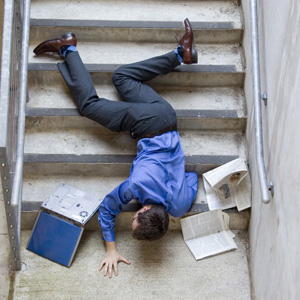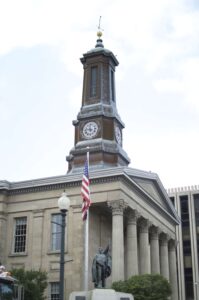
It’s hard to believe but a banana peel can teach a lesson about Pennsylvania Slip and Fall Personal Injury Law. Falls on banana peels don’t just happen in cartoons. One happened in Philadelphia and the court decision that resulted has taught an important lesson about the concept of Notice in Negligence cases.
The Case
A patron of the Save-A-Lot grocery store filed a lawsuit after sustaining injuries in a slip and fall on a bannana peel in the produce aisle of the store.
Unfortunately for the patron, he had no evidence about how the banana got on the floor in the first place or how long it was there before he fell.
The judge dismissed the case because of a lack of evidence of Negligence, reasoning that in order for the store to be held liable, the patron had to prove that the store knew or should have known about the dangerous condition and had enough time to eliminate the hazard.
The Legal Concept of Notice in Pennsylvania Slip and Fall Cases
In order to have a Slip and Fall case in Pennsylvania, an injured person must show that the property owner was Negligent, or careless, by failing to discover and remedy a dangerous condition. However, the law cuts property owners a little slack by only requiring them to act reasonably and fix hazardous conditions that they create or conditions that others create but that the property owner should have noticed through reasonable care.
What does that mean in the context of a banana peel fall in a grocery store? It means that the patron who fell must show that a store employee caused the banana peel to be on the floor OR that the banana peel was on the floor for such a long period of time that the store employees should have noticed it and cleaned it up.
How this can be proven depends on the circumstances and, oftentimes, it cannot be proven resulting in the patron having no case. In other cases there are eyewitnesses or surveillance video that show what happened and prove the case.
This concept of NOTICE is critical in Pennsylvania Slip and Fall cases. Notice can be established in the form of Actual Notice which proves that the store caused the condition or someone testifying that the store actually knew of the condition. In the alternative, Constructive Notice can be established through proof that the dangerous condition existed for such a long period of time that the store should have discovered it.
The bottom line is that Pennsylvania Slip and Fall cases can be hard to prove and win because of this Notice issue. It’s not enough that someone fell and got hurt badly. An injured victim also needs to show that the store was Negligent because it knew or should have known about the hazard and failed to fix it.

Tim Rayne is a Pennsylvania Slip and Fall Lawyer with the Chester County Law Firm MacElree Harvey, Ltd. For over 20 years, Tim has been helping injured victims of Slip and Fall accidents in Pennsylvania receive fair treatment from insurance companies. Contact Tim at trayne@macelree.com or 6108400124 to schedule a Free Consulttation in Tim’s Kennett Square or West Chester offices.






